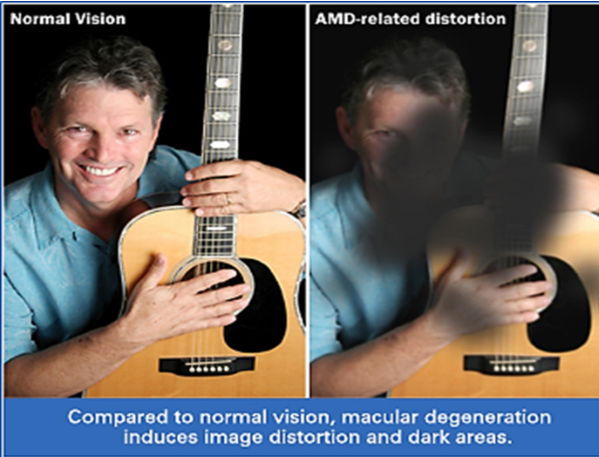Macular Degeneration

The macula provides our clearest central vision. With macular degeneration, central vision distorts and can be lost. Some signs include blurred central vision and waviness of straight lines. Difficulty in reading can be a sign of vision loss.
Are you at Risk
Risk factors for age-related macular degeneration include:
1. Aging
2. Heredity
3. Smoking
4. Obesity
5. High blood pressure
Also, certain medications — such as anti-psychotic drugs and medications used to treat malaria may increase your risk for AMD.
Researchers think there are a number of reasons for macular degeneration like more ultraviolet light, environmental pollution, smoking, poor diet, obesity, etc.”
There are two main types of macular degeneration:
the dry form and the wet form.
Dry Form - Macular Degeneration
Unfortunately, the dry form of macular degeneration is usually not treatable. Examination reveals deposits called drusen near the macula. A breakdown of the macula, called atrophy, is observed. Circulation beneath the macula, called the choriocapillaris, may be affected. More seriously, there is a loss of the photoreceptor cells. These are the very important cells which absorb the light we see.
Wet Form - Macular Degeneration
Although limited, some treatments exist for the “Wet” form of macular degeneration.Wet macular degeneration affects the retina and macula. When the features occur a small distance from the macula, they are called extrafoveal. Features include the formation of tiny abnormal vessel growths under the retina called neovascular membranes. Small hemorrhages can occur under the retina from leaking blood vessels
Pooling of fluid under the retina in the area of the macula can lead to a serous detachment of the retina. The degeneration is subfoveal when membranes and hemorrhages occur directly under the macula. Fluid enters the space between the retina and the pigment epithelium layer and lifts the retina from its normal position
Previously, laser was primarily used to treat some of the wet forms of macular degeneration. Laser photo coagulation was used for those cases with neovascularization next to the macula. The laser applications looked to inhibit the new vessel growth.
New treatment approaches exist for some types of macular edema and the wet form of macular degeneration. Angiogenesis inhibitor medications known as Anti-VEGF, are injected into the eye. They look to inhibit the growth of new blood vessels and neovascular tissue. However, unfortunately, it will not restore vision that is already lost.
Summary
The progression of macular degeneration is slow, and damage is usually irreversible. Early detection through regular eye check-ups is very important, as some forms are treatable. Age-related macular degeneration is one of the most common causes of legal blindness in people over the age of 60. Those with a family history of macular degeneration are at greater risk. It rarely causes total blindness, and low vision aids are available for continued independent living. Any changes to your vision should be brought to your eye care provider’s attention immediately
Contact Us
If you have any other questions or concerns, please contact us at:
The Eye clinic
Dr Swati Agarwal -The Eye Clinic
2A Motilal Basak lane
Kakurgachi
Kolkata, WB 700054
www.swatiagarwal.in
+91 9147714355
[email protected]
Important Note
This information is provided for general educational concepts only. Your specific circumstances, conditions, treatment approaches, and results may vary from those shown here. Additional information, instructions, and precautions are to be provided by and discussed with your eye care provider.
Need Urgent Help?
Call Us: